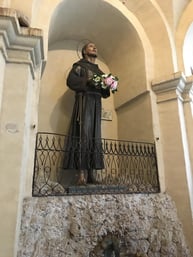“At all time and seasons, in every country and place, every day and all day, we must have a true and humble faith.” -- St. Francis of Assisi
Reflections on the readings for the Memorial of St. Francis of Assisi (October 4, 2022): GAL PS 139:1-3,13-14,14-15; LK 10:38-42
MISSIO offers “Preaching Mission,” as a homily help, providing connections to mission from the readings of Sundays, Feast Days and Holy Days.
Francis attracted followers who wanted to join him in living and preaching the Gospel. The order he called the Friars Minor was recognized by the pope and drew thousands of members in just a few years.
Today we honor one of the most loved and honored saints of all time. St. Francis was born in Assisi in 1181 to a French mother and a father who was a rich silk merchant. In his youth, he was known for his vivacious personality, love of fine clothes, and enjoyment of all the pleasures money could provide. When he was about twenty, he joined a military engagement, was captured and spent a year in prison where he became ill. Returning home, he examined his life with a new seriousness, giving away his possessions and spending much time in prayer. At one point, while in an abandoned chapel, Francis heard God telling him: “Go and repair My church, which as you can see, is in ruins.” At first, he took the words literally and repaired the building. As he pursued a radical form of poverty, he helped those in need, especially lepers. His father disinherited him, but he continued to serve Christ and His Church. Francis attracted followers who wanted to join him in living and preaching the Gospel. The order he called the Friars Minor was recognized by the pope and drew thousands of members in just a few years. Along with St. Clare of Assisi, who wanted to follow Francis’ imitation of Christ as a nun, the order now known as Poor Clares was founded. Soon, those who could not leave their homes or way of life were still able to embrace the Franciscan spirit through a third order for men and women religious and lay people.
Francis desired to share the Good News in Jerusalem and northern Africa. While he was not able to fulfill these missionary activities as he desired, since that time, Franciscans have served in the Holy Land. In the last two years of his life, Francis received the stigmata -- the five wounds of Christ on his hands, feet and side. He was also nearly blind from an eye disease. He died in 1226 and was canonized two years later. St. Francis said, “Keep a clear eye toward life’s end. Do not forget your purpose and destiny as God’s creature. What you are in His sight is what you are and nothing more. Remember that when you leave this earth, you can take nothing that you have received … but only what you have given; a full heart enriched by honest service, love, sacrifice, and courage.” Interest and respect for St. Francis has spread around the world over the centuries, not only among Christians, but many touched by his love for God, His children, and all creation.





